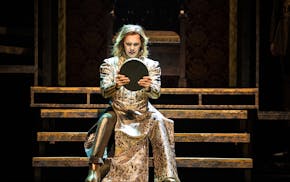Forget flattery. Imitation is the sincerest form of seduction in "Detroit '67," Dominique Morisseau's poetic play of fire-fueled dreams and frustrated love that is set against a backdrop of historic social unrest in Motown.
Formidable actor James T. Alfred plays dapper numbers runner Sly in Shirley Jo Finney's astute and searing production that opened Thursday at Penumbra Theatre in St Paul. Sly has been trying in vain to work his will on Chelle (Austene Van), his best friend's sister, who is a mature single woman with a son away at college. Chelle is having none of it, tensely deflecting his advances.
But Sly wants to help her relax, preferably into his arms, and so he woos her by mimicry, using her inflections and cadences to speak out loud her dreams and desires. She thinks it is cute at first, hearing her words come from the smooth mouth of a man who admires her, but she still remains stiff.
Eventually, as Sly drops his own words onto her cadences, mixing his desires with hers, she begins to smile. She lets her guard down somewhat as she hears truth of her own hunger reflected back at her.
Executed with allure and lyricism by Alfred and Van, the scene is a master class in chemistry and craft in a play with many rich moments.
Finney's production opened tentatively on Thursday (some of the wit of the early going did not land) but firmed up into something gorgeous and revelatory by the end.
"Detroit '67" is Morisseau's aching paean to her natal city. It is set in a Detroit basement where siblings Chelle Poindexter and her younger brother Lank (Darius Dotch), whose parents have died and left an inheritance, have rent parties. Lank and his friend Sly want to buy a neighborhood bar.
Chelle is against the idea, thinking that this is not a good way to spend her parents' hard-earned money. She also wonders about the wits of her brother, who, one night out with Sly, brings a bruised and unconscious white woman (played by Elizabeth Efteland) into their basement.
The play also includes Chelle's friend Bunny (Jamecia Bennett).
While Van and Alfred anchor the cast with their effortless performances, there also are strong turns by Dotch, who gives Lank muscularity and a touch of the poetic (Lank is named for poet Langston Hughes), and by Bennett, who brings sass and style to Bunny. Newcomer Efteland does not give anything away about her mysterious character.
A deft playwright, Morisseau plays expertly with social mores and expectations. She also reframes commonplace things so that we see them in new light. This is true of the Four Tops' lyrics for "Reach Out I'll Be There" and it's true also of the social dance that brackets the action.
In the beginning of "Detroit '67," Van's Chelle is just in the moment as she dances to a recording of the Temptations. By the end, Chelle's dance is loaded with all the emotions and history of the play. It's a poetic and revelatory bookend that, like the drama itself, draws larger, revelatory meaning from the ordinary.
Rohan Preston • 612-673-4390

A former deli maestro steps into Capt. von Trapp's shoes in Artistry's 'Sound of Music'

Review: Guthrie's epic Shakespeare History Plays open in mountainous marathon

Guthrie's epic 12-hour Shakespeare marathon has 3 plays, 3 kings, 25 actors

Ten Thousand Things Theater's artistic director to step down


![Lank, played by Darius Dotch, wraps his arms around Bunny, played by Jamecia Bennett, while they dance. ] BRIDGET BENNETT SPECIAL TO THE STAR TRIBUNE](https://arc.stimg.co/startribunemedia/6UTBI76GE2V5CYP34P7ES2WSZU.jpg?w=600&h=600&auto=format%2Ccompress&cs=tinysrgb)